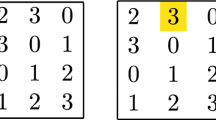Abstract.
In this paper we investigate the problem of computing the maximum number of entries which can be added to a partially filled latin square. The decision version of this question is known to be NP-complete. We present two approximation algorithms for the optimization version of this question. We first prove that the greedy algorithm achieves a factor of 1/3. We then use insights derived from the linear relaxation of an integer program to obtain an algorithm based on matchings that achieves a better performance guarantee of 1/2. These are the first known polynomial-time approximation algorithms for the latin square completion problem that achieve nontrivial worst-case performance guarantees. Our study is motivated by applications to lightpath assignment and switch configuration in wavelength routed multihop optical networks.
Similar content being viewed by others
Author information
Authors and Affiliations
Additional information
Received September 25, 1997; revised February 16, 1998.
Rights and permissions
About this article
Cite this article
Kumar, S., Russell, A. & Sundaram, R. Approximating Latin Square Extensions . Algorithmica 24, 128–138 (1999). https://doi.org/10.1007/PL00009274
Issue Date:
DOI: https://doi.org/10.1007/PL00009274




